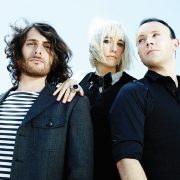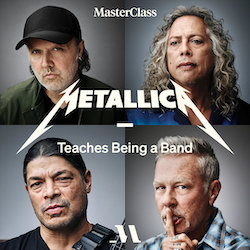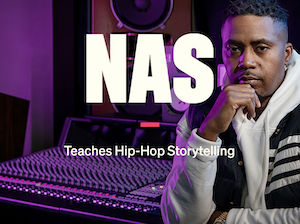Random facts & tips from Canadian Music Week

text: Michael Raine | photography: Brian Patterson
Last week (March 21-25) marked 30 years of Canadian Music Week (CMW). Along with the hundreds of bands that perform throughout Toronto each night as part of the showcase, there’s a four-day conference of speakers, songwriters circles, celebrity Q&A sessions, and discussion panels designed to bring together artists, managers, agents, festival organizers, radio executives, and just about anyone else that has any role to play in the mammoth music industry. Suffice it to say, between the days’ conference sessions and the nights’ concerts, there’s a lot to take in.
Despite most of the discussion being focused on topics that are irrelevant to anyone who isn’t in a band or working in the industry, there were a few things I learned that seemed fascinating to music aficionados.
Here are seven fun, useful, and interesting facts, tips, and anecdotes gathered from experiencing CMW.
1 Stayin’ Alive isn’t a disco song because it doesn’t match the heart rate of someone on cocaine. During the presentation How to Construct Hit Songs by authors Ralph Murphy and Jay Frank, they asked, “What’s the most famous disco song?”
Ninety-nine times out of 100, a person will answer The Bee Gee’s Staying Alive. Guess what, Staying Alive isn’t technically a disco song because it has a beat-per-minute (BPM) rate of 103. And if you notice, in Saturday Night Fever, the song is never used in a dancing scene. According to Murphy, to be a true disco song a tune needs to have a BPM of around 120. Why? Because 120 BPM roughly matches the heart rate of someone on cocaine, which was widely used in disco clubs in the ‘70s.
2 iTunes dictates when a song’s chorus should come in. This also comes from the “Elements of a Hit Song” presentation, which was arguably the most fascinating session I attended (despite the fact that, like a lot of music fans, I find the idea of intentionally writing a hit song to be crass). I’ve heard or read a few times, but never knew the rationalization behind, the notion that the optimal time for a song’s chorus to come in is at the 45 second mark. Apparently there is a really practical reason for this. According to Ralph Murphy, when you sample a song on the iTunes store, unless the person who uploaded the tune changed the settings, the sample will start at the 45-second mark of the song. So, the rationalization goes, if people are only going to hear part of a song before deciding whether to buy it, it’s better that they hear the chorus than part of a verse. Apple really does influence everything.
3 Closing Time isn’t (entirely) about last call. I was stunned by how I – or seemingly anyone else – didn’t notice this the first 500 times I heard Semisonic’s classic ‘90s anthem. As the song’s writer Dan Wilson explained during a songwriters circle, he went through a phase where he was obsessed with writing songs that were about to two totally separate topics simultaneously. As such, Closing Time is partly about closing time at a bar, but it is also, and more predominantly, about the birth of his child. Listen to it again and pay attention to the lyrics and you may, like I was, be struck by how obvious it is once you know that.
4 Paul Rogers made Robert Plant a load of money and also almost became the singer of The Doors. Rogers – who, as singer of the ‘60’s and ‘70s bands Free and Bad Company, was 55 on Rolling Stone magazine’s list of the “100 Great Singers of All Time” – said during a Q&A that in the late ‘60s when he and Plant were both up-and-coming rock singers in England, they were having a drink together when Plant mentioned he had received a called by “some guy named Jimmy Page” and an offer to join his band. Plant had been offered either a flat-rate salary or a percentage of future album sales. Rogers advised Plant to take the percentage, thus making Plant a gazillionaire when Led Zeppelin became the biggest band since Jesus and Moses had jam sessions (– read the Bible, it’s in there somewhere).
Also, Rogers said that not too long ago The Doors’ guitarist Robby Krieger told him that in the ‘70s after Jim Morrison died, the three surviving members of The Doors flew to Europe to recruit Rogers to be their singer but couldn’t track him down. I guess this didn’t dissuade them from later recruiting The Cults‘ Ian Ashbury to go out on tour and piss all over Morrison’s legacy.
5 Facebook is not a replacement for a website. This is a bit of practical advice, a piece that I’m sure a lot of people who had immediately hopped on the social-media bandwagon learned the hard way. This point was brought up during a panel on how artists should use social media. The lesson was: just because you’re active on Twitter and Facebook, it’s no reason to ignore your website. Social networking sites come and go but a website is forever (or at least a lot longer). Fiona Bloom, president of The Bloom Effect, told the story of an artist she represented who had nine million followers on iMeem (remember that?), and when the social networking site disappeared, so did the nine million followers. Alhough the panelists were talking about bands, this is a good thing to keep in mind for anyone who promotes a company, art, a product, or anything else online.
6 If you’re curious about Guns N’ Roses, don’t ask Slash. The legendary guitarist was at CMW for a show and a Q&A session. Like just about everyone there, I was hoping to hear some funny stories about his former band and maybe find out if the original Guns N’ Roses are going to reunite for a performance at their Rock and Roll Hall of Fame induction. I was a bit surprised when Guns N’ Roses was barely even mentioned during the interview. I found out afterward from a friend who interviewed Slash for another publication that media was banned from asking questions about Guns N’ Roses or the induction. Guess he didn’t want to hear the same questions 100 times in three days. Fair enough.
7 Canadian music is fucking awesome [at the moment]. This is more an observation. I was surprised by how many of the artists and bands that impressed me most were Canadian. Although it’s called “Canadian Music Week,” many of the bands playing the showcase are not Canadian, including many of the most-hyped names such as Cloud Nothings and Passion Pit. I was more often blown away by Canadian acts such as The Balconies, PS I Love You, The Pack A.D. (the most badass girl group since Bikini Kill?), and Dan Mangan. Definitely a good sign for us Canucks.














